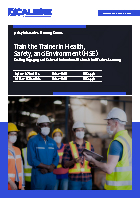| Date | Venue | Fee | |
|---|---|---|---|
| 01 Jun - 05 Jun 2026 | Dubai – UAE | $ 5,950 | Register Now |
| 30 Nov - 04 Dec 2026 | Dubai – UAE | $ 5,950 | Register Now |
About the Course
This 5-day interactive Train the Trainer in Health, Safety, and Environment (HSE) training course is designed to equip individuals with the knowledge and skills needed to train and educate personnel in the HSE field effectively. It focuses on empowering trainers to deliver engaging and impactful training sessions that promote a culture of safety and compliance within organisations. Its initiative aims to empower individuals to become proficient health, safety, and environment trainers. It integrates theoretical knowledge with practical skills to ensure delegates can effectively convey crucial HSE principles to diverse audiences.
It's a concept to empower the potential of the trainers in Health, Safety, and Environment. The "trainer" is the master of the learning process, which empowers systematic and proper leadership qualities and enhances the skills of a potential individual. It is launched to assist trainers in motivating the delegates to learn and teaches trainers various delivery forms that they can adopt to engage with the course content more effectively.
This training programme provides a holistic learning experience, combining theoretical knowledge with practical skills. It ultimately prepares individuals to play a pivotal role in promoting health, safety, and environmental awareness within their workplaces. Graduates emerge as confident, skilled trainers capable of making a positive impact on organisational safety practices and an asset to the company. Therefore, trainers must be trained with care and attention to lead teams and produce practical work.
Core Objectives
The delegates will achieve the following objectives:
- Understand the fundamental principles of Health, Safety, and Environment
- Explore the importance of creating a safe and healthy work environment
- Learn about the psychology of adult learning and how to tailor training to diverse learning styles
- Develop strategies for engaging and motivating trainees
- Enhance verbal and non-verbal communication skills to convey information clearly and concisely
- Practice active listening techniques for better understanding and feedback
- Gain expertise in structuring training programs that meet regulatory requirements and organisational needs
- Develop instructional materials, including presentations, handouts, and multimedia resources
- Develop tools for assessing the impact of training on participants and the overall safety culture
- Implement continuous improvement strategies based on evaluation feedback
- Explore the use of technology for enhancing HSE training, including e-learning platforms and simulations
Training Approach
This training course is presented face-to-face and will utilise various proven adult learning techniques to ensure maximum understanding, comprehension, and retention of the information presented, including presentations of videos, case studies, and discussions to enhance the learning process. Active participation is encouraged during the training programme.
The delegates will be involved in the latest trends in seminar presentations. The classroom presentations are interactive practical exercises supported by audio-visual material and case studies. Delegates will be expected to participate actively.
The Attendees
This training course benefits a wide range of individuals who promote health, safety, and environmental practices within an organisation.
Likewise, it will be valuable to the professionals but not limited to the following:
- HSE Professionals
- Supervisors and Managers
- Human Resources Personnel
- Safety Committee Members
- Facility Managers
- Occupational Health Professionals
- Quality Assurance and Compliance Personnel
- Newly Appointed Safety Coordinators
- Any Employee involved in Training Others
Daily Discussion
DAY ONE: INTRODUCTION TO HEALTH, SAFETY, AND ENVIRONMENT (HSE) TRAINING
- Importance of HSE Training
- Understanding the Role of Trainers in Promoting Safety
- Overview of Regulatory Requirements and Standards
- Principles of Adult Learning and Training
- Adapting Training Techniques for HSE Programs
- Verbal and Non-Verbal Communication
- Active Listening and Feedback Techniques
DAY TWO: DESIGNING HEALTH, SAFETY, AND ENVIRONMENT (HSE) TRAINING PROGRAMMES
- Training Needs Analysis (TNA)
- Identifying Training Needs in HSE
- Conducting TNA for Specific Work Environments
- Developing Learning Objectives
- Writing Clear and Measurable Learning Objectives
- Aligning Objectives with HSE Goals
- Designing Engaging and Effective Training Materials
- Incorporating Multimedia and Interactive Elements
- Creating HSE Training Plans
- Structuring Training Programs for Various Audiences
- Sequencing Modules for Optimal Learning
DAY THREE: DELIVERING ENGAGING HEALTH, SAFETY, AND ENVIRONMENT (HSE) TRAINING SESSIONS
- Effective Presentation Skills
- Techniques for Captivating an Audience
- Managing Nervousness and Building Confidence
- Facilitation Techniques for HSE Training
- Handling Difficult Participants
- Incorporating e-Learning and Virtual Platforms
- Tools for Interactive Online Training
DAY FOUR: EVALUATION AND ASSESSMENT IN HEALTH, SAFETY, AND ENVIRONMENT (HSE) TRAINING
- Types of Assessment in HSE Training
- Pre-training and Post-training Assessments
- Formative and Summative Evaluation
- Feedback and Improvement
- Collecting and Analysing Participants Feedback
- Continuous Improvement in HSE Training Programmes
- Designing and Conducting HSE Simulations
- Evaluating Performance in Simulated Environments
- Review of HSE Training Materials
- Assessing Training Materials for Accuracy and Relevance
DAY FIVE: HEALTH, SAFETY, AND ENVIRONMENT (HSE) TRAINING ADMINISTRATION AND DOCUMENTATION
- Record Keeping and Documentation
- Importance of Documentation in HSE Training
- Maintaining Training Records and Compliance
- HSE Training Logistics
- Planning and Organising Training Sessions
- Managing Resources and Facilities
Certificate Awarded
Upon successful completion of this training course, participants will be awarded a Certificate of Completion from XCalibre Training Centre, acknowledging their accomplishment. This certificate serves as a testament to their dedication to developing their skills and advancing their expertise in their respective fields.

Course Enquiry

A Human Resource Certification Institute (HRCI)® Pre-approved Training Course


